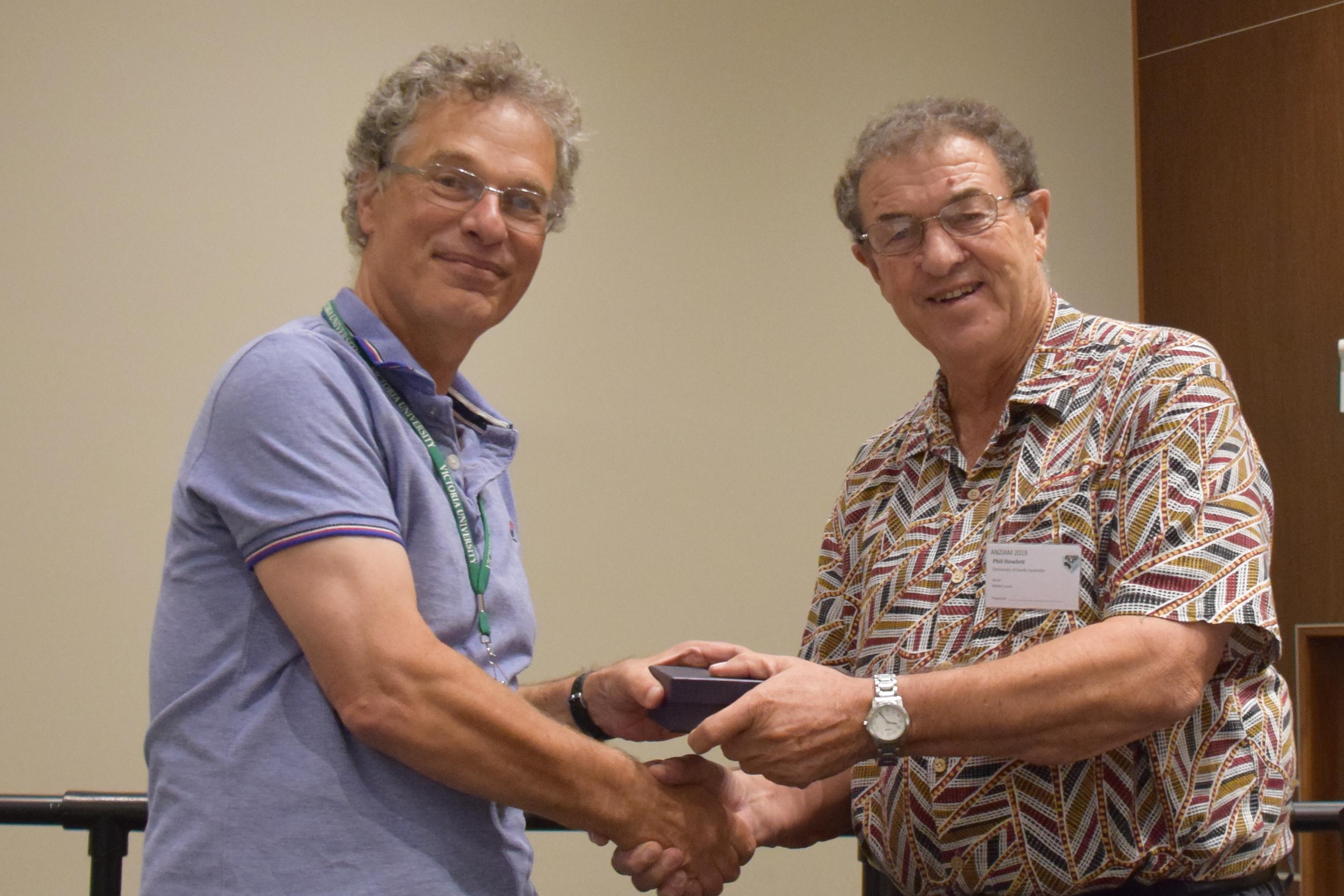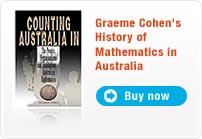The 2019 ANZIAM Medal
Professor Peter Taylor is an outstanding applied mathematician internationally known for his contributions to the theory and applications of mathematics, particularly in the area of applied probability. He has developed modelling, analytical and computational techniques for mathematical structures that are commonly used in the analysis of real-world stochastic systems. Peter Taylor has provided valuable leadership to the mathematics community both nationally as President of the Australian Mathematical Society and internationally through his active roles as editor and reviewer for several respected international journals. Peter Taylor was Chair of ANZIAM and he played a key part in the design and implementation of the ANZIAM/CSIRO Student Support Scheme that has become an exemplar for other similar schemes elsewhere.
The ANZIAM medal is our society’s most prestigious award and recognises research achievement, wide-ranging activities enhancing the discipline of applied and industrial mathematics and contributions to ANZIAM. Peter Taylor has made an outstanding contribution in these three areas and is a most worthy recipient of the ANZIAM medal.

Research Achievements
Peter Taylor was awarded a PhD in 1987 from the University of Adelaide for his work on applied probability under the supervision of Bill Henderson and Charles Pearce. This early work demonstrated both mathematical intuition and rigour. His understanding of the ubiquitous nature of stochastic behaviour in applications was enhanced greatly through his affiliation with the University of Adelaide’s statistical consulting group and the Teletraffic Research Centre (of which Peter was Director for four years), as well as his own consulting work. As a result, Peter’s research interests are extremely broad as is reflected in his current projects which include mechanism design in economic systems, modelling extreme rainfall events, bushfire re-ignition probabilities, the spread of epidemics, nonparametric deconvolution, customer credit card behaviour, biosensor experiments and Bitcoin.
Peter has also made important advances in the study of queueing networks with batch arrivals where his early work with colleagues Bill Henderson and Charles Pearce has been cited by numerous authors. His early work dealt with the related concepts of insensitivity and product-form queueing networks and, with various co-authors, he proved the existence of product-form invariant measures in a number of different multidimensional stochastic models. Two recent highlights are his work with Robert Maillardet on queues with advanced reservations and his work with David Stanford and Ilze Ziedins on accumulating priority queues, which promises to have significant application in healthcare systems.
In 1992, Peter started working with V. Ramaswami on quasi-birth-and-death processes. This collaboration also sparked an interest in matrix-analytic methods and Peter has worked in this area ever since. His 1996 paper with PhD student Les Bright was the first to show how to extend matrix-analytic methods to level-dependent quasi-birth-and-death processes (QBDs) and his 2004 paper with Dirk Kroese and Werner Scheinhardt observed that strange and counter-intuitive behaviour can occur in QBD models that have infinitely-many phases. This paper triggered a number of papers from a variety of authors examining matrix-analytic models with infinite phase spaces, to the extent that their properties are now well-understood. As of 2018, Peter has written 30 research papers in the area of matrix-analytic methods, many with his long-term colleague Guy Latouche. Peter is an internationally-recognised expert in this area, having three times been a Program Co-Chair of the International Workshop on Matrix-Analytic Methods, and having been invited to give extended tutorials on matrix-analytic methods in a number of forums.
With Nigel Bean and Frank Kelly, Peter studied Braess's paradox, in which addition of resources to a network can result in diminished service for all and, with Greg Harmer and Derek Abbott, he provided the first mathematical analysis of Parrondo's games, in which a certain type of mixture of two losing games can be shown to be winning.
Activities Enhancing Applied or Industrial Mathematics
In addition to his formal positions in ANZIAM and AustMS, Peter Taylor has shown exemplary leadership in the wider applied and industrial mathematics community. He is currently Director of the ARC Centre of Excellence for Mathematical and Statistical Frontiers (ACEMS) and an Australian Research Council Laureate Fellow. He has been the Editor-in-Chief of one international journal and is on the Editorial Board of three others. From the beginning of 2019 he will become Editor-in-Chief of Advances in Applied Probability and the Journal of Applied Probability, two of the most prestigious applied probability journals in the world. He has been on awards committees for INFORMS, including chairing the Nicholson Prize Committee, which awards the prize for the best student paper in operations research and management science worldwide and the Applied Probability Section Awards Committee, which awards the Erlang Prize as well as the best paper award in applied probability, again worldwide.
Peter has supervised 26 PhD students, one research masters and 44 honours/coursework masters students to completion, with a number of others in the pipeline. Many of these students have gone on to excellent careers in government, industry or academia.
As Director of the University of Adelaide's Teletraffic Research Centre (TRC) in the late 1990s, Peter was responsible for performance models used by the TRC's major client, Telstra. The mathematical models behind this work spilled over into Peter's research, resulting in papers on many types of telecommunications modelling.
Contributions to ANZIAM
Peter Taylor has been an active member of the ANZIAM community since he first attended the Applied Maths Conference at Merimbula in 1984. He has held the positions of Chair of ANZIAM, President of the Australian Mathematical Society, Secretary of the Applied Maths Conference, Deputy Convenor of the Engineering Mathematics Conference, Chair of the ANZIAM Invited Speakers Committee (twice), Chair of the E.O. Tuck Medal Committee and many other ANZIAM committee roles.
One of Peter’s key achievements as Chair of ANZIAM was to help establish the ANZIAM/CSIRO Student Support Scheme (SSS), which is used to support student attendance at the annual ANZIAM meeting and the meetings of the ANZIAM special interest groups. Peter was responsible for drawing up the principles of the SSS and was the first Chair of the panel that makes the funding awards.
The ANZIAM Medal selection panel unanimously recommends that Professor Peter Taylor be awarded the ANZIAM Medal for 2019.
On behalf of ANZIAM:
Dr Frank de Hoog Professor Kerry Landman Professor Phil Howlett


